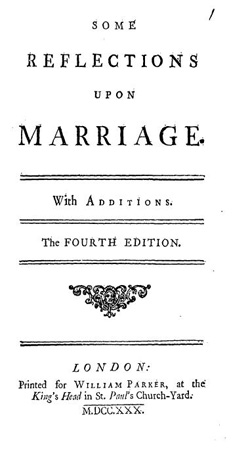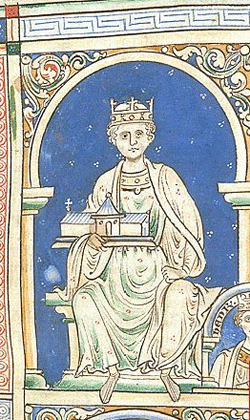|
|---|
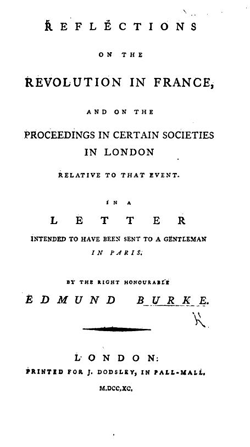 |
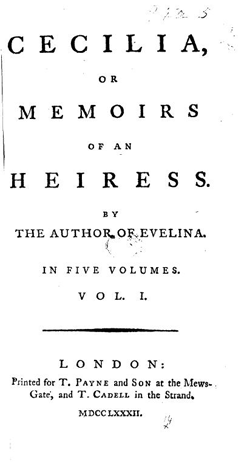 |
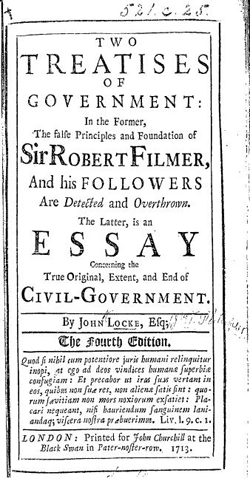 |
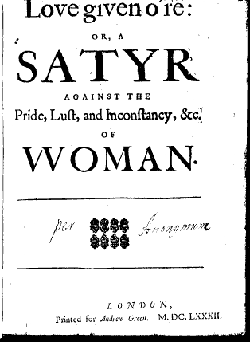 |
|
Women in the Literary Market Place
Mary Astell
Mary Astell and Some Reflections Upon Marriage
Sarah Ellenzweig, "The Love of God and the Radical Enlightenment: Mary Astell's Brush with Spinoza"
Burke
Source
of image
Edmund
Burke - bio
Burke:
Web of English History
Edmund
Burke - Life
Edumund
Burke Page
Edmund Burke's Legacy
Edmund Burke, Stanford Encyclopedia of Philosophy
Richard Price, Observations on the Nature of Civil Liberty, and the Principles of Government
Richard Price, A Discourse on the Love of our Country, delivered on
Thomas Paine - Wikipedia
Burney
Burney Center--online texts
Fanny
Burney - Wikipedia, the free encyclopedia
Frances
(Fanny) Burney d'Arblay (1752-1840)
Burney
and work
Fanny
Burney - Penguin
The Burney
Society
Burny
and Samuel Johnson (Diaries & Letters)
Bibliography
Thrale.com:
Hester and Henry Thrale
The
Unsex'd Female
The materials that follow will emphasize items that concern finance, money, & debt but will not exclude other items:
Articles:
Julia
L. Epstein, "Writing the Unspeakable: Fanny Burney's Mastectomy and the
Fictive Body"
Courting Ruin: The Economic Romances of Frances Burney
Miranda J. Burgess
NOVEL: A Forum on Fiction, Vol. 28, No. 2 (Winter, 1995), pp. 131-153
Imperial Sensibilities, Colonial Ambivalence: Edmund Burke and Frances Burney
Bestsy Bolton
ELH, Vol. 72, No. 4 (Winter, 2005), pp. 871-899
Defiant Women: The Growth of Feminism in Fanny Burney's Novels
Rose Marie Cutting
Studies in English Literature, 1500-1900, Vol. 17, No. 3, Restoration and Eighteenth Century (Summer, 1977), pp. 519-530
The Bullfinch and the Brother: Marriage and Family in Frances Burney's "Camilla"
Elisabeth Rose Gruner
The Journal of English and Germanic Philology, Vol. 93, No. 1 (Jan., 1994), pp. 18-34
Commerce and Masochistic Desire in the 1790s: Frances Burney's "Camilla"
Andrea Henderson
Eighteenth-Century Studies, Vol. 31, No. 1, In Circulation (Fall, 1997), pp. 69-86.
"The Middle State": Italian Opera in Frances Burney's Cecilia Leya Landau
Eighteenth-Century Fiction, Volume 17, Number 4, July 2005, pp. 649-682 (Article)
Money or Mind?: Cecilia, the Novel, and the Real Madness of Selfhood Susan C. Greenfield
Studies in Eighteenth Century Culture, Volume 33, 2004, pp. 49-70 (Article)
The Tyranny of Gift Giving: The Politics of Generosity in Sarah Scott's Millenium Hall and Sir George Ellison McGonegal, Julie.
Eighteenth Century Fiction, Volume 19, Number 3, Spring 2007, pp. 291-306 (Article)
"Spare from Your Luxuries": Women, Charity, and Spending in the Eighteenth Century Catherine Keohane
Studies in Eighteenth Century Culture, Volume 31, 2002, pp. 41-59 (Article)
Reviews:
Divided Fictions: Fanny Burney and Feminine Strategy by Kristina Straub; Frances Burney: The Life in the Works by Margaret Anne Doody; The Iron Pen: Frances Burney and the Politics of Women's Writing by Julia Epstein Review by: Gordon Turnbull Tulsa Studies in Women's Literature, Vol. 10, No. 2 (Autumn, 1991), pp. 324-332
Equivocal Beings: Politics, Gender and Sentimentality in the 1790s. Wollstonecraft, Radcliffe, Burney, Austen by Claudia L. Johnson Review by: Jane Spencer
The Review of English Studies, New Series, Vol. 48, No. 190 (May, 1997), pp. 258-259
Women Writing about Money: Women's Fiction in England, 1790-1820 by Edward Copeland; Equivocal Beings: Politics, Gender, and Sentimentality in the 1790s: Wollstonecraft, Radcliffe, Burney, Austen by Claudia L. Johnson Review by: Janice Farrar Thaddeus
Eighteenth-Century Studies, Vol. 29, No. 2 (Winter, 1995/1996), pp. 235-237.
Colin Nicholson, Writing and the Rise of Finance: Capital Satires of the
Early Eighteenth Century (Cambridge: Cambridge University Press, 1994.
Catherine Gallagher, Nobody's Story: The Vanishing Acts of Women Writers in the Marketplace, 1670-1820. Berkeley: University of California Press, 1994.
James Thompson, Models of Value: Eighteenth-Century Political Economy and the Novel. Durham: Duke University Press, 1996
Sandra Sherman, Finance and Fictionality in the Early Eighteenth Century: Accounting for Defoe. Cambridge:Cambridge University Press, 1996.
Locke
John Locke - Wikipedia
John Locke: Internet Encyclopedia of Philosophy
John Locke: Stanford Encyclopedia of Philosophy
Locke: Philosophy Pages
Bibliography (See also this site.)
Locke: Works online
Locke, Second Treatise
Locke, Two Treatises (modernized)
Richard Ashcraft, "Revolutionary Politics and Locke's
Two Treatises of Government: Radicalism and Lockean Political Theory"
Kelly,
Patrick, Revolutionary Politics and Locke's Two
Treatises of Government. (review)
Peter Laslett, "The English Revolution and Locke's 'Two Treatises of Government'"
Thompson, Martyn P., "Significant Silences in Locke's Two Treatises of Government: Constitutional History, Contract and Law"
Tuckness, Alex, "Rethinking the Intolerant Locke"
Wilhelm, Anthony G., "Good Fences and Good Neighbors: John Locke's Positive Doctrine of Toleration"
Oxford University. The Judgment and Decree of the University of Oxford, past in their Convocation, July 21, 1683, against certain pernicious books, and damnable doctrines, destructive to the sacred persons of princes, their State and Government, and all Human Society. Oxford, 1683. 9p. (Reprinted in Farrer, Books Condemned to Be Burnt, pp. 191-99)
Following the Rye House Plot to kill Charles II, Oxford University issued this decree for the public burning of certain pernicious books, including works by Milton, Goodwin, Baxter, Knox, and Hobbes.
Review: [untitled]
C. W. Brooks
Reviewed work(s): The Ancient Constitution and the Feudal Law. A Study of English Historical Thought in the Seventeenth Century. A Reissue with a Retrospect by J. G. A. Pocock
The English Historical Review, Vol. 105, No. 416 (Jul., 1990), pp. 733-735
Page Scan PDF Summary
Anne Kugler, "Constructing Wifely Identity: Prescription and Practice in the Life of Lady Sarah Cowper"
Carole
Pateman, "'God Hath Ordained to Man a Helper': Hobbes, Patriarchy
and Conjugal Right"
Melinda
Zook, "Early Whig Ideology, Ancient Constitutionalism, and the Reverend
Samuel Johnson"
Some post-1987 reviews of The Ancient Constitution and the Feudal Law
C. W. Brooks Reviewed work(s): The Ancient Constitution and the Feudal Law. A Study of English Historical Thought in the Seventeenth Century. A Reissue with a Retrospect by J. G. A. Pocock
The English Historical Review, Vol. 105, No. 416 (Jul., 1990), pp. 733-735.
Paul Christennson, Reviewed work(s): Dangerous Positions: Mixed Government, the Estates of the Realm, and the 'Answer to the XIX Propositions' by Michael Mendle; Sir John Davies and the Conquest of Ireland: A Study in Legal Imperialism by Hans S. Pawlisch; The Ancient Constitution and the Feudal Law: English Historical Thought in the Seventeenth Century: A Reissue with a Retrospect by J. G. A. Pocock; Politics and Ideology in England 1603-1640 by J. P. Sommerville,The Historical Journal, Vol. 30, No. 4 (Dec., 1987), pp. 955-970.
Satires against women
Legal Material
Glanvil, Tractatus de legibus et consuetudinibus regni Angliae (Treatise on the laws and customs of the Kingdom of England, 1188, written for Henry II) translation;, 1900. (A Google books download), 1220s to 1250s.
Bracton, De legibus et consuetudinibus Angliae (On the Laws and Customs of England)
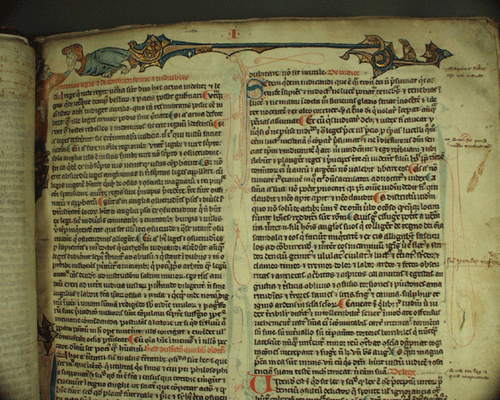
Isaac Kramnick, "The "Great National Discussion": The Discourse of Politics in 1787"
Anon. The Charity and loyalty of some of our clergy in a short view of Dr. M's sermon before their Majesties at Hampton-Court, July the 14th, 1689 : where-in he still charges the Protestant dissenters with schism : with some occasional remarks upon a clergy-mans considerations for taking the Oath of allegiance to King William and Queen Mary, and upon the history of passive obedience since the Reformation., London : Printed for Richard Janeway, 1689.
Anon. A hue and crye after passive-obedience, and non-resistance Being a true character of a de-facto-man. Licensed according to order. August 15th. 1690., [London] : [printed for R. Baldwin], 1690
Anon. The maximes of mixt monarchy: to resolve all good consciences by right principles, of the royall and righteous power in the person of the King and the Parliament. 1. All persons are subject to the King. 2. The King is subject to the lawes. 3. The lawes are subject to the powers that make them. 4. The powers that make laws are politicall. 5. This politicall power is in three estates. 6. These three estates are co-ordinate. 7. Co-ordination is in Parliament. 8. The Parliament is above all persons. 9. All persons are bound to obey it. 10. All obedience is active or passive. 11. No man may resist in any thing. 12. They that resist shall receive damnation., [London : s.n., 1643
Anon. The true notion of passive-obedience stated, and clear'd from the mistakes of those who are for and against it, London : Printed, and are to be sold by Richard Baldwin ..., 1690
Seller, Abednego, 1646?-1705. The History of self-defence, in requital to the history of passive obedience, London : Printed for D. Newman ..., 1680
Bohun, Edmund, 1645-1699. The doctrine of non-resistance or passive obedience, no way concerned in the controversies now depending between the Williamites and the Jacobites by a lay gentleman of the communion of the Church of England, by law establish'd., London : Printed for Richard Chiswell ..., 1689
Fowler, Edward, 1632-1714. A vindication of the divines of the Church of England who have sworn allegiance to K. William & Q. Mary, from the imputations of apostasy and perjury, which are cast upon them upon that account, in the now publish'd History of passive obedience / by one of those divines., London : Printed for Brabazon Aylmer ..., 1689
Hickes, George, 1642-1715. A letter to the author of a late paper, entituled, A vindication of the divines of the Church of England, &c. in defence of the history of passive obedience., [London? : s.n.], 1689
Johnson, Samuel, 1649-1703. Reflections on the History of passive obedience by Samuel Johnson., [London : Printed for Richard Baldwin, 1689
Stillingfleet, Edward, 1635-1699. A discourse concerning the unreasonableness of a new separation, on account of the oaths with an answer to the History of passive obedience, so far as relates to them., London : Printed for Richard Chiswell ..., 1689
Anon. The Army no usurpers, or The late Parliament not almighty and everlasting: shewing, that the present army in their former opposing, and late dissolving of the Parliament, have done nothing contrary to law, but according to equity. And that the late Parliaments claim of power to do what they please, until they should be dissolved by their own consent, is long since made void by their own act., London, : Printed for Giles Calvert, at the sign of the Black-spread Eagle, at the West end of Pauls., 1653
Anon. [A Brief] vindication of the Parliamentary proceedings against the late King James II proving that the right of succession to government (by nearness of blood) is not by the law of God or nature, but by politick institution : with several instances of deposing evil princes, shewing, that no prince hath any title originally but by the consent of the people., London : Printed and sold by Randall Taylor ..., 1689
Anon.The case stated touching the soveraign's prerogative and the peoples liberty, according to scripture, reason, and the consent of our ancestors. Humbly offered to the right honorable, General Monck, and the officers in the army., London : printed for Charles King, 1660
Ashcraft, Richard and M. M. Goldsmith, "Locke, Revolution Principles, and the Formation of Whig Ideology"
Belsey, Catherine, "Tarquin Dispossessed: Expropriation and Consent in The Rape of Lucrece"
Ellenzweig, Sarah, "The Love of God and the Radical Enlightenment: Mary Astell's Brush with Spinoza"
Goldie, Mark, "John Locke's Circle and James II"
Kelly, Joan, "Early Feminist Theory and the 'Querelle des Femmes', 1400-1789"
Joan K. Kinnaird, "Mary Astell and the Conservative Contribution to English Feminism"
Kramnick, Isaac, "The 'Great National Discussion': The Discourse of Politics in 1787"
McDowell, Gary L. "The Language of Law and the Foundations of American Constitutionalism"
Nussbaum, Felicity, "Introduction: The Politics of Difference"
Rudolph, Julia, "Rape and Resistance: Women and Consent in Seventeenth-Century English Legal and Political Thought"
Ruether, Rosemary Radford, "Prophets and Humanists: Types of Religious Feminism in Stuart England"
Seidel, Michael A., "Poulain De La Barre's The Woman as Good as the Man"
Severance, Mary Laura, "Sex and the Social Contract"
Shanley, Mary Lyndon, "Marriage Contract and Social Contract in Seventeenth Century English Political Thought"
Skinner, Quentin, "History and Ideology in the English Revolution"
Springborg, Patricia, "Mary Astell (1666-1731), Critic of Locke"
Stevens, Jacqueline, "The Reasonableness of John Locke's Majority: Property Rights, Consent, and Resistance in the Second Treatise"
Taylor, E. Derek, "Mary Astell's Ironic Assault on John Locke's Theory of Thinking Matter"
Thompson, Martyn P., "Significant Silences in Locke's Two Treatises of Government: Constitutional History, Contract and Law"
Tuckness, Alex, "Rethinking the Intolerant Locke"
Wilhelm, Anthony G., "Good Fences and Good Neighbors: John Locke's Positive Doctrine of Toleration"
Womersley, David, "Gibbon's Unfinished History: The French Revolution and English Political Vocabularies"
William Blackstone on innovation
John Dryden, Absalom and Achitophel
Lex Scripta: Philosophy
The Norman Yoke - Wikipedia
Restoration poems(The Return of the King : An Anthology of English Poems Commemorating the Restoration of Charles II, edited by Gerald MacLean)
English/British Mondarchs
Source
on the internet
House
of Wessex
![]() Egbert (802-39)
Egbert (802-39)
![]() Aethelwulf (839-55)
Aethelwulf (839-55)
![]() Aethelbald (855-60)
Aethelbald (855-60)
![]() Aethelbert (860-6)
Aethelbert (860-6)
![]() Aethelred (866-71)
Aethelred (866-71)
![]() Alfred, the
Great (871-99)
Alfred, the
Great (871-99)
![]() Edward, the
Elder (899-925)
Edward, the
Elder (899-925)
![]() Athelstan (925-40)
Athelstan (925-40)
![]() Edmund, the
Magnificent (940-6)
Edmund, the
Magnificent (940-6)
![]() Eadred (946-55)
Eadred (946-55)
![]() Eadwig
(Edwy), All-Fair (955-59)
Eadwig
(Edwy), All-Fair (955-59)
![]() Edgar, the
Peaceable (959-75)
Edgar, the
Peaceable (959-75)
![]() Edward, the
Martyr (975-78)
Edward, the
Martyr (975-78)
![]() Aethelred, the Unready (978-1016)
Aethelred, the Unready (978-1016)
![]() Edmund, Ironside (1016)
Edmund, Ironside (1016)
Danish Line
![]() Svein, Forkbeard (1014)
Svein, Forkbeard (1014)
![]() Canute, the
Great (1016-35)
Canute, the
Great (1016-35)
![]() Harald, Harefoot (1035-40)
Harald, Harefoot (1035-40)
![]() Hardicanute (1040-42)
Hardicanute (1040-42)
House of Wessex, Restored
![]() Edward, the
Confessor (1042-66)
Edward, the
Confessor (1042-66)
![]() Harold II (1066)
Harold II (1066)
Norman Line
![]() William I, the Conqueror (1066-87)
William I, the Conqueror (1066-87)
![]() William
II, Rufus (1087-1100)
William
II, Rufus (1087-1100)
![]() Henry I, Beauclerc (1100-35)
Henry I, Beauclerc (1100-35)
![]() Stephen (1135-54)
Stephen (1135-54)
![]() Empress Matilda (1141)
Empress Matilda (1141)
Plantagenet, Angevin Line
![]() Henry II, Curtmantle (1154-89)
Henry II, Curtmantle (1154-89)
![]() Richard I the
Lionheart (1189-99)
Richard I the
Lionheart (1189-99)
![]() John, Lackland (1199-1216)
John, Lackland (1199-1216)
![]() Henry III (1216-72)
Henry III (1216-72)
![]() Edward I, Longshanks (1272-1307)
Edward I, Longshanks (1272-1307)
![]() Edward II (1307-27)
Edward II (1307-27)
![]() Edward III (1327-77)
Edward III (1327-77)
![]() Richard II (1377-99)
Richard II (1377-99)
Plantagenet,
Lancastrian Line
![]() Henry IV, Bolingbroke (1399-1413)
Henry IV, Bolingbroke (1399-1413)
![]() Henry V (1413-22)
Henry V (1413-22)
![]() Henry VI (1422-61, 1470-1)
Henry VI (1422-61, 1470-1)
Plantagenet, Yorkist Line
![]() Edward IV (1461-70, 1471-83)
Edward IV (1461-70, 1471-83)
![]() Edward V (1483)
Edward V (1483)
![]() Richard
III, Crookback (1483-85)
Richard
III, Crookback (1483-85)
House of
Tudor
![]() Henry VII, Tudor (1485-1509)
Henry VII, Tudor (1485-1509)
![]() Henry VIII (1509-47)
Henry VIII (1509-47)
![]() Edward VI (1547-53)
Edward VI (1547-53)
![]() Lady
Jane Grey (1553)
Lady
Jane Grey (1553)
![]() Mary I, Tudor (1553-58)
Mary I, Tudor (1553-58)
![]() Elizabeth I (1558-1603)
Elizabeth I (1558-1603)
House of Stuart
![]() James I (1603-25)
James I (1603-25)
![]() Charles I (1625-49)
Charles I (1625-49)
House
of Stuart, Restored
![]() Charles II (1660-85)
Charles II (1660-85)
![]() James II (1685-88)
James II (1685-88)
House of
Orange and Stuart
![]() William
III, Mary II (1689-1702)
William
III, Mary II (1689-1702)
House of Stuart
![]() Anne (1702-14)
Anne (1702-14)
House of
Brunswick, Hanover Line
![]() George I (1714-27)
George I (1714-27)
![]() George II (1727-60)
George II (1727-60)
![]() George III (1760-1820)
George III (1760-1820)
![]() George IV (1820-30)
George IV (1820-30)
![]() William IV (1830-37)
William IV (1830-37)
![]() Victoria (1837-1901)
Victoria (1837-1901)
